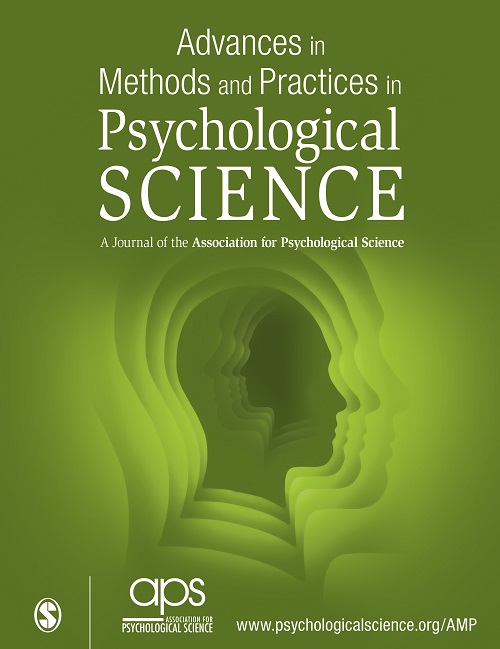Effective Maps, Easily Done: Visualizing Geo-Psychological Differences Using Distance Weights
IF 15.6
1区 心理学
Q1 PSYCHOLOGY
Advances in Methods and Practices in Psychological Science
Pub Date : 2022-07-01
DOI:10.1177/25152459221101816
引用次数: 0
Abstract
Psychologists of many subfields are becoming increasingly interested in the geographical distribution of psychological phenomena. An integral part of this new stream of geo-psychological studies is to visualize spatial distributions of psychological phenomena in maps. However, most psychologists are not trained in visualizing spatial data. As a result, almost all existing geo-psychological studies rely on the most basic mapping technique: color-coding disaggregated data (i.e., grouping individuals into predefined spatial units and then mapping out average scores across these spatial units). Although this basic mapping technique is not wrong, it often leaves unleveraged potential to effectively visualize spatial patterns. The aim of this tutorial is to introduce psychologists to an alternative, easy-to-use mapping technique: distance-based weighting (i.e., calculating area estimates that represent distance-weighted averages of all measurement locations). We outline the basic idea of distance-based weighting and explain how to implement this technique so that it is effective for geo-psychological research. Using large-scale mental-health data from the United States (N = 2,058,249), we empirically demonstrate how distance-based weighting may complement the commonly used basic mapping technique. We provide fully annotated R code and open access to all data used in our analyses.有效的地图,容易完成:可视化使用距离权重的地理心理差异
许多分支领域的心理学家对心理现象的地理分布越来越感兴趣。这一新的地理心理学研究潮流的一个组成部分是在地图上可视化心理现象的空间分布。然而,大多数心理学家都没有受过可视化空间数据的训练。因此,几乎所有现有的地理心理学研究都依赖于最基本的制图技术:对分解数据进行颜色编码(即,将个体分组到预定义的空间单元中,然后绘制出这些空间单元的平均得分)。尽管这种基本的映射技术并没有错,但它往往没有充分利用有效可视化空间模式的潜力。本教程的目的是向心理学家介绍另一种易于使用的绘图技术:基于距离的加权(即,计算代表所有测量位置的距离加权平均值的面积估计)。我们概述了基于距离的加权的基本思想,并解释了如何实现这一技术,使其有效地用于地质心理学研究。利用来自美国的大规模心理健康数据(N = 2,058249),我们从经验上证明了基于距离的加权如何补充常用的基本映射技术。我们提供了完整的注释R代码,并对我们分析中使用的所有数据开放访问。
本文章由计算机程序翻译,如有差异,请以英文原文为准。
求助全文
约1分钟内获得全文
求助全文
来源期刊
CiteScore
21.20
自引率
0.70%
发文量
16
期刊介绍:
In 2021, Advances in Methods and Practices in Psychological Science will undergo a transition to become an open access journal. This journal focuses on publishing innovative developments in research methods, practices, and conduct within the field of psychological science. It embraces a wide range of areas and topics and encourages the integration of methodological and analytical questions.
The aim of AMPPS is to bring the latest methodological advances to researchers from various disciplines, even those who are not methodological experts. Therefore, the journal seeks submissions that are accessible to readers with different research interests and that represent the diverse research trends within the field of psychological science.
The types of content that AMPPS welcomes include articles that communicate advancements in methods, practices, and metascience, as well as empirical scientific best practices. Additionally, tutorials, commentaries, and simulation studies on new techniques and research tools are encouraged. The journal also aims to publish papers that bring advances from specialized subfields to a broader audience. Lastly, AMPPS accepts Registered Replication Reports, which focus on replicating important findings from previously published studies.
Overall, the transition of Advances in Methods and Practices in Psychological Science to an open access journal aims to increase accessibility and promote the dissemination of new developments in research methods and practices within the field of psychological science.

 求助内容:
求助内容: 应助结果提醒方式:
应助结果提醒方式:


